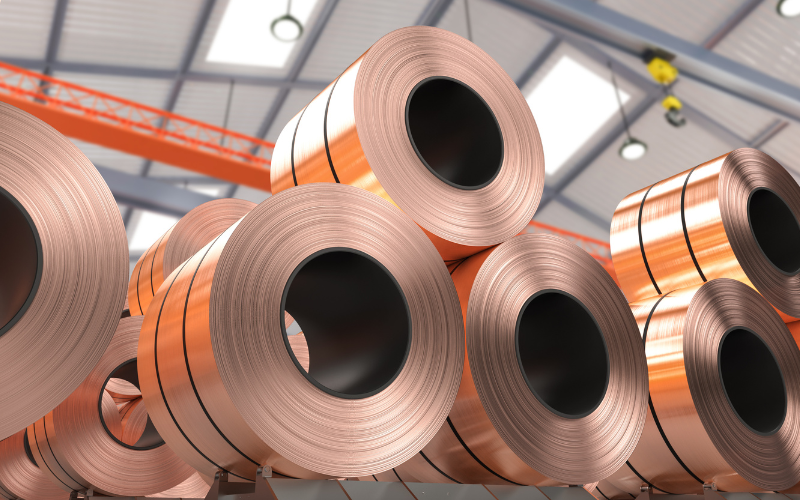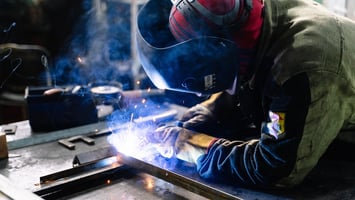In the world of construction and engineering, choosing the right metal for projects in harsh...
Kryton Metals Blog
Exploring Red Metals: Is Copper, Brass, or Bronze Right for Your Next Fabrication Project?

When it comes to metal fabrication, choosing the right material is crucial for the success of a project. Red metals, such as copper, brass, and bronze, offer unique properties that can make them ideal for various applications. These metals are known for their excellent corrosion resistance, attractive appearance, and versatility.
There are some situations where mild steel, stainless steel, or aluminum might not be the most suitable choice. For those cases, using brass, bronze, or copper might be better options, each offering their own distinct characteristics that set them apart. Understanding these differences will help you make an informed decision about which red metal best suits your fabrication needs.
COPPER
Copper is known for its excellent electrical and thermal conductivity, making it an ideal choice for electrical wiring components, plumbing, and heat exchangers. Its distinct reddish-brown color and natural antimicrobial properties also make it popular in architectural designs and medical applications. Compared to brass and bronze, copper is the purest form of red metals, which gives it unique characteristics like superior conductivity. However, it’s relatively soft and can be prone to scratches and dents
Copper is ideal for use in electrical wiring applications, roofing, and various industrial machinery. Its microbial properties makes it suitable for use in hospitals and food processing facilities. Additionally, its aesthetic appeal makes for impressive decorative arts and architectural accents.
Copper Advantages:
- Excellent electrical and thermal conductivity
- Antimicrobial properties
- High corrosion resistance
- Attractive aesthetic appeal
- Forms a natural patina over time, enhancing corrosion resistance
- Superior electromagnetic interference (EMI) shielding capabilities
- Exceptional thermal expansion properties
Copper Disadvantages:
- Relatively soft and prone to damage
- Higher material cost compared to some other metals
- Requires regular maintenance to prevent tarnishing
BRASS
Brass is an alloy of copper and zinc, and its composition can vary to produce a range of mechanical and electrical properties. It is known for its bright gold-like appearance and excellent machinability, making it a favorite in musical instruments, decorative hardware, and plumbing fixtures. Brass is more durable and stronger than pure copper, but it doesn’t conduct electricity as well. Its resistance to corrosion, particularly in environments with high humidity and saline content, makes it suitable for maritime applications.
Brass is often used in plumbing, marine hardware, musical instruments, and decorative applications. Its durability and resistance to corrosion make it suitable for use in environments exposed to moisture and saltwater.
Brass Advantages:
- Excellent machinability
- Corrosion resistance, especially in saline environments
- Attractive gold-like appearance
- Good strength and hardness
- Non-sparking properties; ideal where flammable gasses or liquids are present
- Bactericidal effect of brass is more pronounced, can be used in high-contact surfaces
- Some alloys have excellent acoustic properties, preferred for musical instruments
Brass Disadvantages:
- Lower electrical conductivity compared to pure copper
- Can tarnish over time without proper maintenance
- Higher cost than some other common metals
BRONZE
Bronze is primarily an alloy of copper and tin, though other elements like aluminum, manganese, and nickel can also be added to enhance its properties. Known for its reddish-brown color and historical significance, bronze is highly resistant to wear and corrosion, especially in seawater environments.
It is harder and more durable than brass, making it ideal for heavy-duty applications such as bearings, bushings, and marine hardware. It is also used in sculptures and architectural elements, providing a classic and timeless aesthetic. Bronze also offers good thermal and electrical conductivity, though not as high as pure copper.
Bronze Advantages:
- High resistance to wear and corrosion
- Strong and durable
- Good machinability
- Attractive reddish-brown color
- Low friction properties, reducing wear and tear significantly
- Some alloys have self-lubricating properties; no need for additional lubrication
- Non-magnetic; suitable for minimal EMI applications, such as in underwater cables and sensors
Bronze Disadvantages:
- Lower electrical and thermal conductivity compared to copper
- Can be more expensive due to the alloying elements
- Requires regular maintenance to maintain appearance
METAL SPINNING
Metal spinning, also known as spin forming, is a process where metals - such as mild steel, stainless steel, aluminum, copper, brass, bronze, and more - are shaped into hollow, symmetrical objects by rotating them on a lathe. This technique allows for the creation of precise and intricate designs, making it ideal for producing components like bowls, domes, and decorative pieces.
Metal spinning is highly efficient and produces minimal waste, making it an economical choice for fabricating red metals. The unique properties of these metals, such as their corrosion resistance and aesthetic appeal, are retained throughout the process, resulting in durable and visually pleasing products.
WRAPPING UP
In conclusion, red metals like copper, brass, and bronze offer unique advantages for various metal fabrication projects. Their distinct properties, such as excellent corrosion resistance, aesthetic appeal, and durability, make them ideal for a wide range of applications. Whether you're looking for the antimicrobial benefits of copper, the decorative versatility of brass, or the robustness of bronze, these metals provide solutions that are both practical and visually stunning. By understanding their strengths and optimal uses, you can make informed decisions for your next fabrication project.
Experience superior craftsmanship and precision with Kryton Engineered Metals. Our expertise lies in top-tier metal spinning solutions using various red metals. Want to learn more about using the right material for your project or interested in requesting a quote? Click here to get in touch with us!



